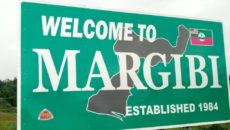Liberia’s post-conflict democratic governance period left its people deprived, desperate, and destitute. Liberians believe that the vast resources of the country were squandered, plundered, and pillaged. As a result, they rose up during the election to hold Ellen Johnson Sirleaf and the Unity Party accountable by overwhelmingly electing George Weah president and Jewel Howard-Taylor as vice president. The Liberian people frantically wanted change at any cost due to their bitterness, anger, and disappointment.
After 12 years of the country’s best opportunity to fundamentally root transformative social change was squandered, Joseph Boakai became the fall guy for the country’s collective hurt. During the presidency of Sirleaf, poverty became overwhelmingly endemic, while corruption, nepotism, and patronage became the order of the day. Liberians simply could not stomach anything Sirleaf or Unity Party after 12 years of pure hell. The overwhelming majority of Liberians lost faith in the governing institutions of the country and in the elite that controlled them. They believed that the country had been on the wrong track for the past 12 years, so they rejected Joseph Boakai.
The result of the December 26 runoff election was a rebuke of kleptocracy in favor of inclusion and transformative social change. Most Liberians flatly disapproved of Sirleaf’s performance while in office, believing that they had nothing to lose after the country’s most educated and celebrated leader failed them so miserably. The success of the Coalition for Democratic Change is quite an achievement for a party that is supported mostly by young people, many of whom were abandoned, neglected, excluded, and marginalized by Ellen Johnson Sirleaf for the past 12 years.
The 2017 election shocked the country to its core. George Weah and the CDC must now seize this golden opportunity to impact the economy and the social order in a big way. The Weah victory should be nothing more than unsettling basic ideas and assumptions about development and transformative social change. Poverty needs to be tackled immediately in order to improve livelihoods, social conditions, awareness, and outlook. The enormous expectations of the young people, many of whom are unskilled, unqualified, and unemployed, must be dealt with constructively in a holistic manner because the vast majority of Liberians believe that their ‘suffering’ will come to an end after George Weah takes office in January.
Weah must remember that he won the presidency because his coalition was able to effectively mobilize the Liberian people to accept the hard truths that the country will be faced with over the next decade. The CDC coalition rode the wave of change generated by the miserable failure of the Unity Party lead by Ellen Johnson Sirleaf. Hence, they have been granted a huge opportunity by the Liberian people to make a significant difference in the lives of the youth and poverty-stricken masses. The time has now come to govern and lead the country to greatness. The Weah administration must initiate strategic policies of inclusion, and not fuel policies of marginalization and exclusion, which could allow the country to return to violence, bloodshed, and destruction. Weah must leverage the result of the elections to build an inclusive society where the livelihood of all Liberians can be improved.
Without delay, the state must emphatically declare as offensive and unacceptable, cronyism, corruption, nepotism, undeserved privilege, and the use of state resources for self-enrichment. As a replacement, strategies must be developed to constructively engage the huge youth bulge in an inclusive manner to ignite transformative social change throughout the country. Reform measures must be put in place to remake the entire education, healthcare, and agricultural sectors to enhance a conducive and enabling social environment to improve life, wellbeing, and progress. This is the legacy that Liberia deserves. The country and its political structures must never again be allowed to be manipulated and used for personal benefit. Incompetent, selfish, and greedy people must be eliminated to fundamentally bring about transformative social change.
Those civil and public servants who go in to assist the CDC should be prepared to not use their office as a magnet for kickbacks and enticements. Extreme poverty, hardship, unemployment, illiteracy, insecurity, and hopelessness are still the order of the day for millions of Liberians. Over 70 percent of our people lack education, skillsets, opportunity, and basic services to participate in and grow the economy. Countless number of youth and women continue to experience extreme limitations in accessing opportunities and income to improve livelihood and entrepreneurial skills.
To begin this process, the Weah administration must immediately commission a fiscal audit and comprehensive appraisal of all concession agreements of the Sirleaf administration. The new government should also consider establishing mechanisms to provide robust opportunities to confiscate and repatriate stolen government funds hidden away in foreign banks. Our country’s enormous natural resource endowment must translate into economic progress and better quality of life for all Liberians. It is disgusting and unacceptable to imagine the squandering of our national resources while children die daily throughout the country due to poverty and curable diseases.
After 12 years of corruption, nepotism, and mismanagement, Liberia deserves a government of inclusion, access, participation, equity, and development. Those social cancers that plagued the Sirleaf administration should never again be allowed to manifest themselves or permeate our governance structures by becoming impediments which prevent our country from realizing transformative social change. Our country should never again be allowed to become a destitute pariah state as it once was. The vast resources of our country should be used to provide the foundation for enviable development and economic growth, and definitely not a curse, for over 80 percent of Liberians who live below the poverty line.



